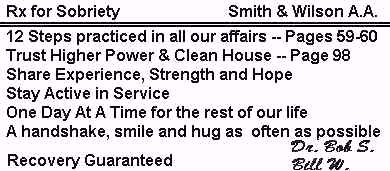

 Click The Images To Go To Page Indicated By Bill W. -- AA Grapevine - March 1962 -- One way to get at the meaning of the principle of acceptance is to meditate upon it in the context of AA's much used prayer, "God grant me the serenity to accept the things I cannot change, courage to change the things I can, and the wisdom to know the difference." Essentially this is to ask for the resources of grace by which we may make spiritual progress under all conditions. Greatly emphasized in this wonderful prayer is a need for the kind of wisdom that discriminates between the possible and the impossible. We shall also see that life's formidable array of pains and problems will require many different degrees of acceptance as we try to apply this valued principle. Sometimes we have to find the right kind of acceptance for each day. Sometimes we need to develop acceptance for what may come to pass tomorrow, and yet again we shall have to accept a condition that may never change. Then, too, there frequently has to be a right and realistic acceptance of grievous flaws within ourselves and serious faults within those about us - defects that may not be fully remedied for years, if ever. All of us will encounter failures, some retrievable and some not. We shall often meet with defeat - sometimes by accident, sometimes self-inflicted, and at still other times dealt to us by the injustice and violence of other people. Most of us will meet up with some degree of worldly success, and here the problem of the right kind of acceptance will be really difficult. Then there will be illness and death. How indeed shall we be able to accept all these? It is always worthwhile to consider how grossly that good word acceptance can be misused. It can be warped to justify nearly every brand of weakness, nonsense, and folly. For instance, we can "accept" failure as a chronic condition, forever without profit or remedy. We can "accept" worldly success pridefully, as something wholly of our own making. We can also "accept" illness and death as certain evidence of a hostile and godless universe. With these twistings of acceptance, we AAs have had vast experience. Hence we constantly try to remind ourselves that these perversions of acceptance are just gimmicks for excuse-making: a losing game at which we are, or at least have been, the world's champions. This is why we treasure our Serenity Prayer so much. It brings a new light to us that can dissipate our old-time and nearly fatal habit of fooling ourselves. In the radiance of this prayer we see that defeat, rightly accepted, need be no disaster. We now know that we do not have to run away, nor ought we again try to overcome adversity by still another bulldozing power drive that can only push up obstacles before us faster than they can be taken down. On entering AA, we become the beneficiaries of a very different experience. Our new way of staying sober is literally founded upon the proposition that "Of ourselves, we are nothing, the Father doeth the works." In Steps One and Two of our recovery program, these ideas are specifically spelled out: "We admitted we were powerless over alcohol that our lives had become unmanageable" - "Came to believe that a Power greater than ourselves could restore us to sanity." We couldn't lick alcohol with our own remaining resources and so we accepted the further fact that dependence upon a higher power (if only our AA group) could do this hitherto impossible job. The moment we were able to fully accept these facts, our release from the alcohol compulsion had begun. For most of us this pair of acceptances had required a lot of exertion to achieve. Our whole treasured philosophy of self-sufficiency had to be cast aside. This had not been done with old-fashioned willpower; it was instead a matter of developing the willingness to accept these new facts of living. We neither ran nor fought. But accept we did. And then we were free. There had been no irretrievable disaster. This kind of acceptance and faith is capable of producing 100 percent sobriety. In fact it usually does; and it must, else we could have no life at all. But the moment we carry these attitudes into our emotional problems, we find that only relative results are possible. Nobody can, for example, become completely free from fear, anger, and pride. Hence in this life we shall attain nothing like perfect humility and love. So we shall have to settle, respecting most of our problems, for a very gradual progress, punctuated sometimes by heavy setbacks. Our old-time attitudes of "all or nothing" will have to be abandoned. Therefore our very first problem is to accept our present circumstances as they are, ourselves as we are, and the people about us as they are. This is to adopt a realistic humility without which no genuine advance can even begin. Again and again, we shall need to return to that unflattering point of departure. This is an exercise in acceptance that we can profitably practice every day of our lives. Provided we strenuously avoid turning these realistic surveys of the facts of life into unrealistic alibis for apathy or defeatism, they can be the sure foundation upon which increased emotional health and therefore spiritual progress can be built. At least this seems to be my own experience. Another exercise that I practice is to try for a full inventory of my blessings and then for a right acceptance of the many gifts that are mine - both temporal and spiritual. Here I try to achieve a state of joyful gratitude. When such a brand of gratitude is repeatedly affirmed and pondered, it can finally displace the natural tendency to congratulate myself on whatever progress I may have been enabled to make in some areas of living. I try hard to hold fast to the truth that a full and thankful heart cannot entertain great conceits. When brimming with gratitude, one's heartbeat must surely result in outgoing love, the finest emotion that we can ever know. In times of very rough going, the grateful acceptance of my blessings, oft repeated, can also bring me some of the serenity of which our prayer speaks. Whenever I fall under acute pressures I lengthen my daily walks and slowly repeat our Serenity Prayer in rhythm to my steps and breathing. If I feel that my pain has in part been occasioned by others, I try to repeat, "God grant me the serenity to love their best, and never fear their worst." This benign healing process of repetition, sometimes necessary to persist with for days, has seldom failed to restore me to at least a workable emotional balance and perspective. Another helpful step is to steadfastly affirm the understanding that pain can bring. Indeed pain is one of our greatest teachers. Though I still find it difficult to accept today's pain and anxiety with any great degree of serenity - as those more advanced in the spiritual life seem able to do - I can, if I try hard, give thanks for present pain nevertheless. I find the willingness to do this by contemplating the lessons learned from past suffering - lessons which have led to the blessings I now enjoy. I can remember, if I insist, how the agonies of alcoholism, the pain of rebellion and thwarted pride, have often led me to God's grace, and so to a new freedom. So, as I walk along, I repeat still other phrases such as these, "Pain is the touchstone of progress" . . . "Fear no evil". . . "This, too, will pass" . . . "This experience can be turned to benefit." These fragments of prayer bring far more than mere comfort. They keep me on the track of right acceptance; they break up my compulsive themes of guilt, depression, rebellion, and pride; and sometimes they endow me with the courage to change the things I can, and the wisdom to know the difference. To those who never have given these potent exercises in acceptance a real workout, I recommend them highly the next time the heat is on. Or, for that matter, at any time! Index of AA History Pages on Barefoot's Domain As in so many things, especially with we alcoholics, our History is our Greatest Asset!.. We each arrived at the doors of AA with an intensive and lengthy "History of Things That Do Not Work" .. Today, In AA and In Recovery, Our History has added an intensive and lengthy "History of Things That DO Work!!" and We will not regret the past nor wish to shut the door on it!!
KEEP COMING BACK!
On the Web April 4, 2003 in the Spirit of Cooperation Three mighty important things, Pardn'r, LOVE And PEACE and SOBRIETY |

